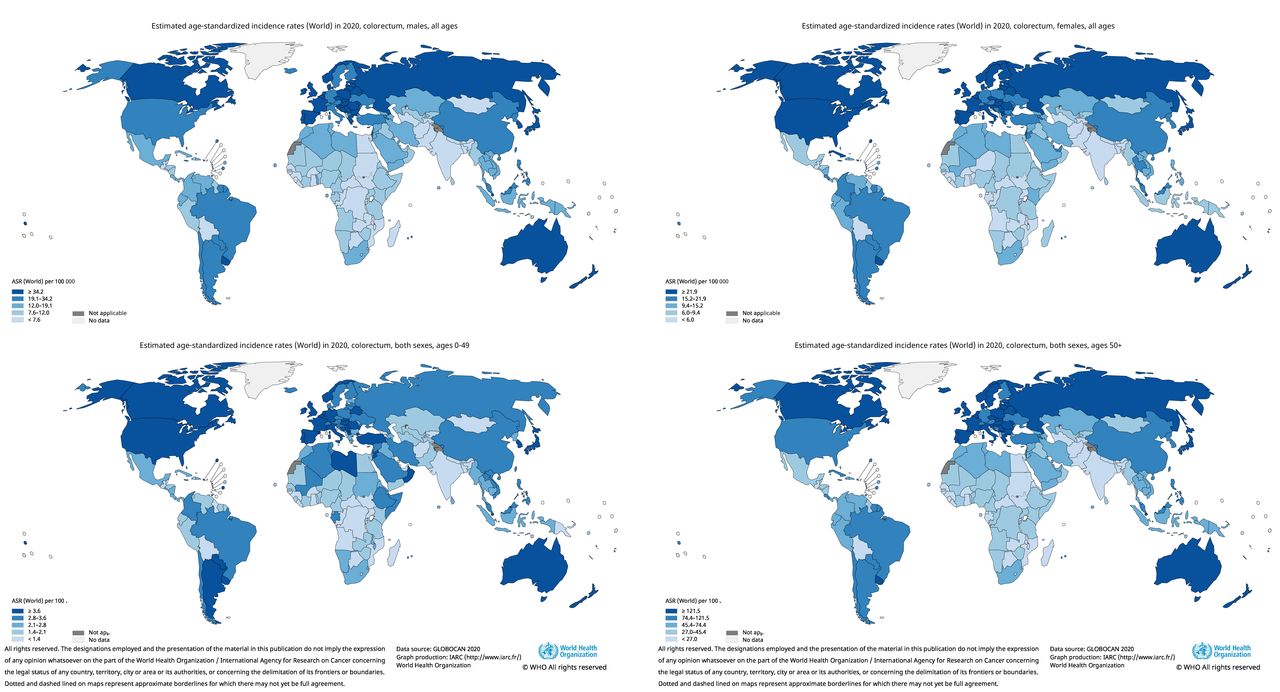
### The Rise of Colorectal Cancer in Younger Individuals: An Urgent Appeal for Global Health
A recent worldwide study released in *The Lancet Oncology* has brought to light a concerning and escalating public health issue: the incidence of colorectal cancer diagnosed in people under the age of 50 is alarmingly increasing across the globe. This pattern transcends various geographical and economic landscapes, indicating a considerable generational change in the disease’s epidemiology and creating pressing concerns regarding prevention, diagnosis, and public education.
### A Worldwide Pattern with Local Variations
The investigation, spearheaded by the American Cancer Society (ACS) under Dr. Hyuna Sung, analyzed colorectal cancer data from 50 nations and found that 27 (or 54%) witnessed rising rates of early-onset cases. Notably, fourteen countries, including the United States, were highlighted for experiencing increased rates in younger populations while rates for older adults (those above 50) either stabilized or decreased.
Some of the most significant statistics came from specific areas like New Zealand and Chile, which reported yearly increases of 4.0% in early-onset colorectal cancer cases. Puerto Rico followed closely with a 3.8% annual rise. Likewise, developed countries like the United States, England, and Australia exhibited troubling upward trends among younger populations, even as they noted declines in older cohorts. These findings reveal a global pattern but with marked differences across nations.
### Variations in Cancer Trends by Gender
Gender significantly influenced the findings, with rates escalating more rapidly among males in certain countries, such as Chile, Puerto Rico, and Sweden, while younger females showed more pronounced increases in England, Norway, and Australia. Understanding these gender-specific trends could yield vital insights into risk factors driving the increase.
The highest overall rates of early-onset colorectal cancer—between 14 and 17 cases per 100,000 individuals—were identified in Australia, Puerto Rico, New Zealand, the United States, and the Republic of Korea. These nations not only feature elevated current incidence rates but also display a steep upward trend, emphasizing the rising challenge posed by colorectal cancer among younger individuals.
### Factors Contributing to the Increase
Though the exact reasons behind this rise remain elusive, researchers have highlighted several contributing factors:
1. **Diet and Obesity**: Western diets, marked by high intake of red and processed meats, sugary drinks, and low dietary fiber, have been linked to an increased risk of colorectal cancer. The growing prevalence of obesity globally is another important risk factor.
2. **Lifestyle Habits**: Decreased physical activity, alcohol intake, and smoking may also play a role in escalating rates, particularly in urban settings.
3. **Alterations in Gut Microbiome**: Emerging studies suggest that modifications in the gut microbiome, influenced by diet and antibiotic use, could impact susceptibility to colorectal cancer.
4. **Late Diagnosis**: Younger individuals are less likely to participate in routine screenings, leading to diagnoses at more advanced stages and an apparent increase in incidence.
5. **Genetic Factors**: In some situations, inherited genetic mutations, such as Lynch syndrome, may make younger people more susceptible to colorectal cancer.
Michelle Mitchell, the chief executive of Cancer Research UK, stated that the results underscore a pressing need for heightened awareness and prompt action: “This research has revealed for the first time ever that rates are rising more sharply in England than in many other countries around the world.”
### Urgent Appeal: Screening and Awareness Initiatives
Traditionally viewed as a disease associated with aging, colorectal cancer has led to many countries recommending regular screenings only after age 50. However, in light of the shifting demographics, experts are calling for a reevaluation of these guidelines.
The United States has already adjusted its routine colorectal screening age from 50 to 45 following early indications of rising cases among young adults. Other nations, particularly those experiencing pronounced increases, would likely benefit from similar adjustments. Early diagnosis is vital—colorectal cancer is highly treatable in its initial stages, with five-year survival rates nearing 90% for localized cases.
Public education campaigns that highlight symptoms such as blood in stool, ongoing abdominal pain, and changes in bowel habits can also aid in reducing the stigma that younger individuals might face when seeking medical guidance.
### Understanding Colorectal Cancer
Colorectal cancer arises in the colon or rectum, often evolving from benign growths known as polyps. Over time, certain polyp types, particularly adenomatous ones, can progress into cancer, especially if they exceed 1 cm, appear in groups, or show abnormal cellular changes. In advanced stages, the illness can metastasize through blood and lymph vessels to other regions of the body.
Key risk factors include advancing age, family history, dietary choices, smoking, and conditions leading to inflammation of the bowel, such as ulcerative colitis and Crohn’s disease.
### Key Terminology Glossary
– **Early